

Every black hole contains a new universe: A physicist presents a solution to present-day cosmic mysteries. Our universe may exist inside a black hole.
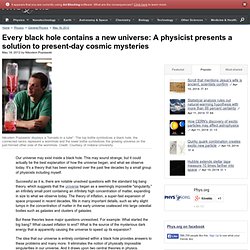
This may sound strange, but it could actually be the best explanation of how the universe began, and what we observe today. It's a theory that has been explored over the past few decades by a small group of physicists including myself. Successful as it is, there are notable unsolved questions with the standard big bang theory, which suggests that the universe began as a seemingly impossible "singularity," an infinitely small point containing an infinitely high concentration of matter, expanding in size to what we observe today.
The theory of inflation, a super-fast expansion of space proposed in recent decades, fills in many important details, such as why slight lumps in the concentration of matter in the early universe coalesced into large celestial bodies such as galaxies and clusters of galaxies. But these theories leave major questions unresolved. The first is general relativity, the modern theory of gravity. ChronoZoom. ChronoZoom is an educational tool for teachers and students who want to put historical events in perspective.

A great many resources have been created already in ChronoZoom for your enjoyment and enlightenment. Start Exploring Use ChronoZoom to get a perspective of the extensive scale of time and historical events relative to what happened around the world. Become an author yourself! Simply log on with your social networking credentials to record your unique perspective or tell a story that needs to be told.
New Teacher Resources RT @MSFTResearch: See how #Chronozoom helps students “think historically” & travel though time with 3 newly created curriculum modules http… #chronozoom is a valuable tool for illustrating Climate Change: @metanexus Anyone can author their small or Big History on the 14 Billion year timeline at - an open source project. @BillGates Congratulations to the Big History Project. RT @BillGates: Big History is my favorite course ever. Theoretical Physicist Brian Greene Thinks You Might Be a Hologram.
Author and theoretical physicist Brian Greene discusses science fiction, Star Trek and parallel universes in this edition of the Geek's Guide to the Galaxy podcast.
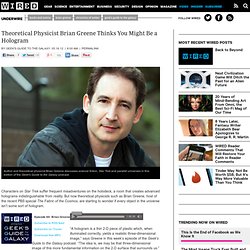
Characters on Star Trek suffer frequent misadventures on the holodeck, a room that creates advanced holograms indistinguishable from reality. But now theoretical physicists such as Brian Greene, host of the recent PBS special The Fabric of the Cosmos, are starting to wonder if every object in the universe isn’t some sort of hologram. “A hologram is a thin 2-D piece of plastic which, when illuminated correctly, yields a realistic three-dimensional image,” says Greene in this week’s episode of the Geek’s Guide to the Galaxy podcast. “The idea is, we may be that three-dimensional image of this more fundamental information on the 2-D surface that surrounds us.” This notion, known as the holographic principle, came out of the study of black holes. What's In a Number: Unravelling a Multiversal Paradox. You made an article about a readers idea?
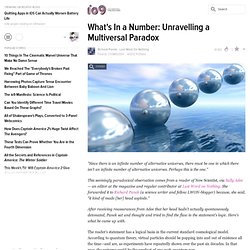
I gotta get me some of that! :D Firstly, I don't think this is a good idea. It does make sense at all, universes don't define their relationship to other universes in the Omniverse. However, I have had similar theories. In the wider Omniverse, as opposed to our local Multiverse, there are, supposedly, varying physics.* This would mean that Earth, although identical in every way to our own, might in another universe have a gravitational acceleration of 7 ms. Picture captures a billion stars. The Ashtray: Hippasus of Metapontum (Part 3) What happened before the Big Bang? "we get extra speculative" Truer words were never spoken.
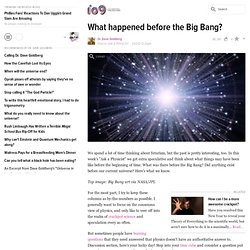
Now, as for Model #1: There can be no "big bang" event (effect) without an initiator to have (caused) said event. How can some "small bubble" of a universe just spring up from nothing? It can't. Model #2: Very imaginative, but how can something that hasn't come into existence yet, sart "going around and around in some imagined continuous loop? " Model #3: Again for this very imaginative speculation to be true, it would require a first universe that started the first supposed "collapse. " Sadly, inorder to makesure that a Creator is not even considered at all costs, proponents of abiogenesis and evolution will concoct so many unbelievably rediculous ideas. They rather speculate and accept the nonsensical, than simply accept the obvious: An eternal and powerful, sentient being designed and produced all matter and the laws and properties that guide it and sparked life on this planet.
Home. What will happen when the Sun dies? Yup.
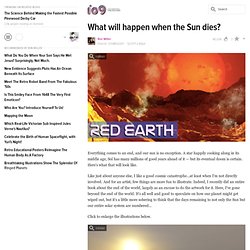
We'd all be in it together... as corpsicles or space dust. My second biggest fear is this. My first is the big crunch. Not that I'd be around for either of the events, but I still fear them for the simple reason that they're (well at least the sun thing) going to happen and are scary. The big crunch is plausible, but so is the universe just slowing down and laying stagnate- which will likely throw gravity off I assume. With the sun thing... eesh... granted the planet will have likely destroyed or take back all of what we've done on it before the event of the sun's death, but still... imagine stuff like the pyramids just melting away. Plus I'd like to believe in an afterlife (no matter how un-scientific that is) and wonder if it happens to merely be another dimension, what happens if the universe contracts?
...now I sound like a crazy person. The accidental universe: Science's crisis of faith—By Alan P. Lightman.